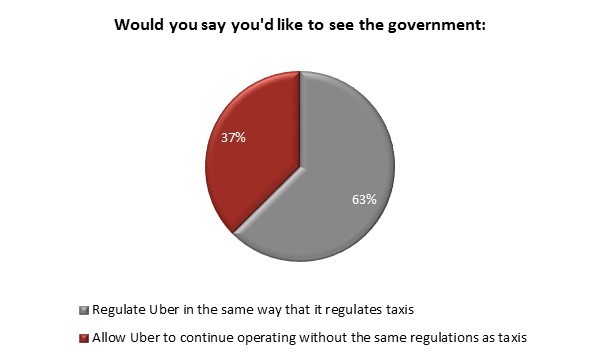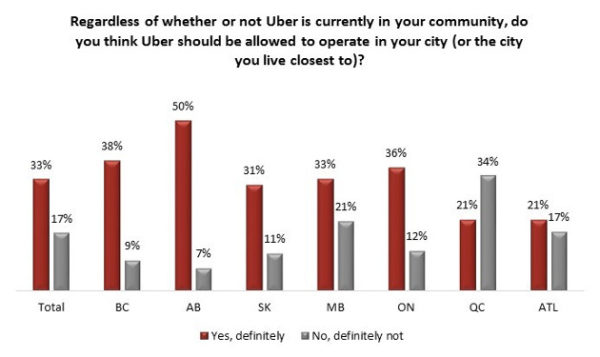Image may be NSFW.
Clik here to view. The Angus Reid Institute has released the results of their research into two companies central to the sharing economy, Airbnb and Uber, titled “Few Canadians support banning Uber; but most want it regulated the same as taxi industry”.
The Angus Reid Institute has released the results of their research into two companies central to the sharing economy, Airbnb and Uber, titled “Few Canadians support banning Uber; but most want it regulated the same as taxi industry”.
Which means that while Canadians are certainly open to the idea of Uber joining the mix of transportation options they currently have, they also labour under the misconception that Uber is somehow a taxi company.
What’s clear from the survey, as well as from the taxi industry’s reaction to Uber and the perhaps wilfully duplicitous way that Uber presents itself, is that Canadians are unclear as to what Uber is and what its eventual ubiquity actually means, not so much for the future of transportation as for the future of employment, and how we agree to classify the roles of “employee” and “employer” who choose to engage with each other through a platform.
That lack of clarity is not helped by images of striking taxi drivers blockading roads and disrupting the lives of the general public, which allows Uber to present itself as the victim of “monopoly interests”, or by the spectacle of utterly clueless politicians muddying the waters with frankly idiotic statements like Toronto City Councillor Glenn De Baeremaeker’s claim that “UberX is illegal. UberX is unfair. UberX is unsafe. If you are in an UberX right now, get the heck out,” adding, “If you love somebody, do not let them get into an UberX cab,” as if he were talking about Rob Ford’s SUV or getting checked out for chlamydia.
In the wake of Edmonton’s legalization of Uber, the ride sharing platform has finally gained a toe-hold to legitimacy in the Canadian market after shaky debuts in other jurisdictions.
Uber was outright banned in Calgary after surprising the otherwise amenable mayor because it chose to simply roll out their service while negotiating a framework for Uber’s eventual launch.
Mayor Naheed Nenshi said, “The funny thing about this is, up until the day they launched, they were working with us on this stuff and then they chose to launch without the regulatory environment in place.”
In both Toronto and Montreal, Uber operates illegally depending on who you listen to, or at the very best in a legal grey zone.
The Angus Reid survey finds that 63% of respondents agree that Uber should be regulated like any other cab company. The only issue there is one of terminology, in that Uber doesn’t present itself as a taxi company.
Clik here to view.

Source: Angus Reid Institute
Uber merely develops the ride-sharing platform connecting a rider with a driver, and then lets each driver work out their freelance employment relationship with the government for themselves.
Essentially Uber presents itself as a “communications service”, not a taxi service, and therefore not subject to municipal, provincial or federal laws.
Last summer, Ontario Supreme Court Justice Sean Dunphy agreed with that definition, ruling in Uber’s favour after the City of Toronto sought a permanent injunction on Uber’s operation on the basis that it competes with the taxi industry without having to deal with any of the red tape inherent in being a taxi company.
It’s right there in Uber’s terms of service, which states that “Uber does not provide transportation or logistics services or function as a transportation carrier,” which is odd considering that Uber appears to be very much in the transportation and logistics services business, as it rolls out decidedly transportation-esque services such as UberRUSH and UberEats.
Meanwhile, six Ottawa Uber drivers have pleaded guilty to operating a taxi without a license and have been fined accordingly, promising never to break the bylaw again by driving for Uber.
So until there’s a consistent legal judgement on whether Uber is or is not a taxi company, or whether it’s in the transportation business at all or merely an app, you can perhaps forgive a little confusion over how, or whether, it should be regulated and taxed.
A little counterintuitively, 57% of respondents also say they favour allowing Airbnb to continue to operate as it has been doing, without being regulated like the hotel industry.
Perhaps that finding jibes with the public’s perception of the two companies, given that the Angus Reid survey also finds that 70% of respondents have a positive view of Airbnb, a figure which drops down to 61% for the same question with regard to Uber.
It’s possible that news stories about Uber’s “we are not a taxi company” tactic negatively affects the public’s attitude, even while a majority are open to the idea of Uber operating in their town.
Let there be no misconception, however, that the arrival of services like Uber, Airbnb and Netflix herald a new paradigm that can either be embraced or litigated, with the litigators working in the knowledge that they’re essentially trying to put toothpaste back into a tube.
Companies like these are the future, and incumbent companies who face disruption can either compete with them or stand in the road beside a pile of burning tires with a sign in their hand, looking like idiots.
Feeding the cognitive dissonance is Uber’s refusal to be classified as a taxi company, and at least one legal victory supporting that claim, while 63% of respondents to the Angus Reid survey support the idea of “governments regulating Uber in exactly the same way as they do taxis” while 37% would like to allow “Uber to continue operating without the same regulation in taxis”.
There’s that “taxi” word again. You’d think Uber was in the taxi business or something.
That number jumps to 73% in Quebec, which has seen several high-profile taxi industry protests while Mayor Denis Coderre has consistently stuck to his line that Uber is illegal and should be shut down.
Transport Quebec has handed out fines and impounded the cars of several Uber drivers, but UberX continues to operate despite the legal ambiguity surrounding its “service”, whether that service turns out to be “taxi company” or “transportation company” or merely “technology platform provider”.
Quebec, though, has recently shifted its stance at the provincial level, with a cabinet shuffle and the appointment of Jacques Daoust to Minister of Transport, who said recently that Uber is “here to stay”, and that “everyone recognizes the importance for the taxi industry to modernize,” adding, “We must put in place rules that ensure the end of unfair competition.”
Clik here to view.

Source: Angus Reid Institute
What’s obvious is that even if Uber denies that it is a taxi company, or that it’s even in the transportation or delivery business, that is not how Canadians perceive it, according to the survey.
Uber, and companies like it, will eventually become an uncontroversial part of the legitimate economy. So the question becomes, how do we facilitate that process?
As with Netflix, a California company with four million Canadian subscribers and yet completely unregulated by the CRTC with all revenue flowing back to its U.S. headquarters and no question of Netflix paying in to the Canadian Media Fund, it’s only a matter of time before similar questions are asked about how long companies like Uber can be allowed to operate without being asked to compete on the same playing field as other Canadian companies.
But who are Uber’s competitors? Clearly Uber poses a threat to the taxi industry, even though their drivers apparently aren’t taxi operators.
39% of respondents in the Angus Reid survey say they worry that “Uber will make working conditions worse for their own drivers and for taxi drivers”.
But Uber drivers aren’t “their own”. Uber has successfully argued, at least in Ontario Supreme Court, that UberX drivers are “partners”, or itinerant workers or freelancers, depending on your perspective.
The survey also finds that 57% of Canadians “don’t feel comfortable with Uber raising prices during peak hours”, which taxi companies are prohibited by law from doing.
So if we let Uber into one market, do they then have to set a fixed rate for their service and get rid of the algorithmic surge pricing? If not, then you’ve got taxis playing by one set of rules and Uber by another.
Again, until Uber’s legal and tax classification status is worked out, not to mention similar platforms like Airbnb and Netflix, questions about whether Canadians would like to see Uber regulated “in exactly the same way as they do taxis” are basically moot.
Uber argues that it isn’t a taxi company, but regulators and Canadians are operating under the misconception that they are.
The post Angus Reid research shows Canadians open-minded but ill-informed about Uber appeared first on Cantech Letter.